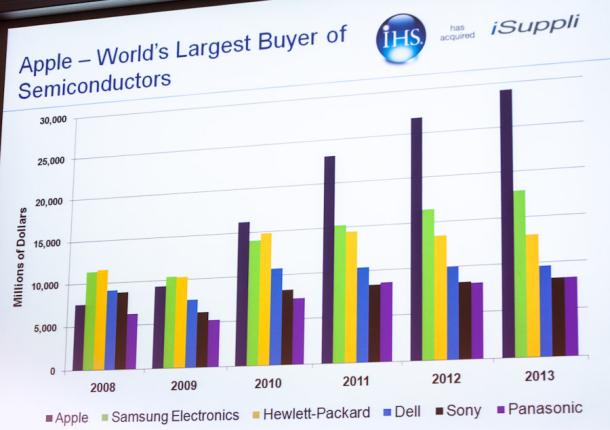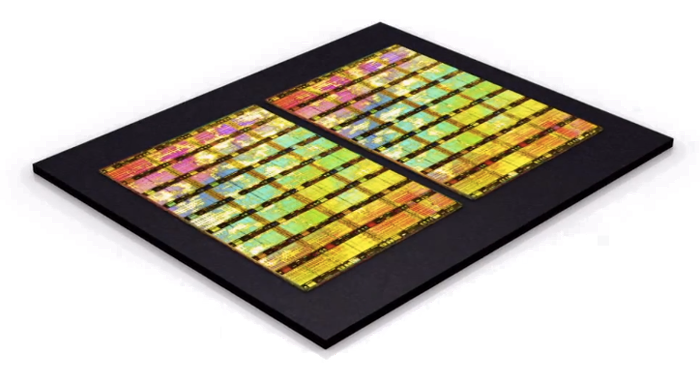Apple expected to spend $27 billion on semiconductors in 2012
Last updated
Dale Ford, IHS iSuppli's head of electronics and semiconductor research, made the prediction at the firm's Technology, Media and Telecommunications Summit, CNet reported on Tuesday. According to him, Apple is set to maintain a huge lead on second-place Samsung through at least 2013.
Apple jumped up from being the third-largest buyer of semiconductors in 2009 to the front of the pack in 2010. The firm estimates Apple spent $23 billion on semiconductors in 2011, over 50 percent more than its closest rivals. Ford noted that Apple's microprocessor spending has risen from $9 billion in 2009 to a projected $27 billion this year and $29 billion next year.
Meanwhile, Samsung was said to have spent $15 billion on chips in 2011. Looking ahead, the South Korean electronics maker is expected to purchase about $16 billion worth of semiconductors in 2012 and $18 billion next year. Samsung's case is unique in that is both one of the largest consumers and suppliers of semiconductors in the world.
Pretty much everybody has to take pretty conscious account of where Apple and where Samsung will be," Ford reportedly said. "In industrial, automotive, and every other sector, their reach, influence, and size has been a significant change."
Credit: IHS iSuppli, via CNet
As for suppliers, Intel still remains the largest chipmaker with about 15 percent share of the semiconductor market, which was estimated to be $311 billion last year. Samsung came in second with 9 percent of the market.
IHS iSuppli's numbers differ from estimates released by market research group Gartner earlier this year. According to those figures, Apple spent $17 billion in 2011, compared to Samsung's $16.7 billion.
Separately, analysts have been taking note of Apple and Samsung's combined size. A note from Barclays Equity Research on Tuesday examined which industries and companies will be affected by continued growth from the two giants. Analyst Ben Reitzes outlined certain suppliers producing semiconductors, displays and communications equipments that will benefit from Apple, while noting that companies like Dell, Hewlett-Packard, Microsoft, Research in Motion and Nokia will be "challenged" as they compete against Apple and Samsung.
As Apple's multiple device strategy has taken shape in recent years, the company has been steadily acquiring semiconductor-related assets. In 2008, Apple's then CEO Steve Jobs declared that the company was setting out to design its own iPhone and iPod chips with the help of P.A. Semi, a fabless semiconductor company that it acquired earlier that year.
Aided by a later purchase of chipmaker Intrinisty, Apple designed the A4 system-on-a-chip processor that made its way into the original iPad and iPhone 4 in 2010. The Cupertino, Calif., company also holds a minority stake in Imagination Technologies, the chip designer that has provided graphics processors for its A-series chips.
More recently, Apple purchased Anobit, an Israel-based flash memory component maker. As growing sales of the iPhone and iPad increase Apple's flash memory needs, Anobit's "Memory Signal Processing" technology could help cut down on costs and improve reliability.
Apple is also believed to be building a semiconductor R&D center in Israel. In late April, reports suggested Apple had initiated a "major hiring campaign" for the facility.
 Josh Ong
Josh Ong















 Amber Neely
Amber Neely
 Thomas Sibilly
Thomas Sibilly
 AppleInsider Staff
AppleInsider Staff
 William Gallagher
William Gallagher
 Malcolm Owen
Malcolm Owen
 Christine McKee
Christine McKee










17 Comments
What is this thing? It's not an iPad, so what is it?
What is this thing? It's not an iPad, so what is it?
A poorly-alpha'd image of an uncut processor board.
It's also stylized, as that's not what they look like, if I remember correctly.
[quote name="Hyram Gestan" url="/t/150241/apple-expected-to-spend-27-billion-on-semiconductors-in-2012#post_2114208"] What is this thing? It's not an iPad, so what is it? [/quote] It's a piece taken from the Bifrost..
Just brainstorming here, for shits'n giggles...: Intel's market cap is $130 billion at the moment, how long before Apple's cash reserve exceeds that, and what would happen if Apple would buy Intel?
Who's your daddy!